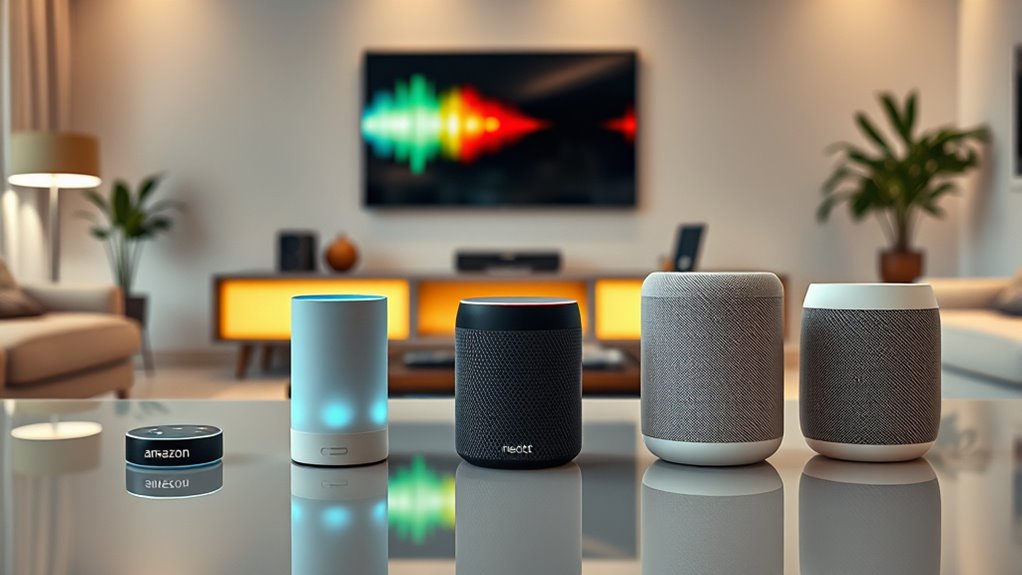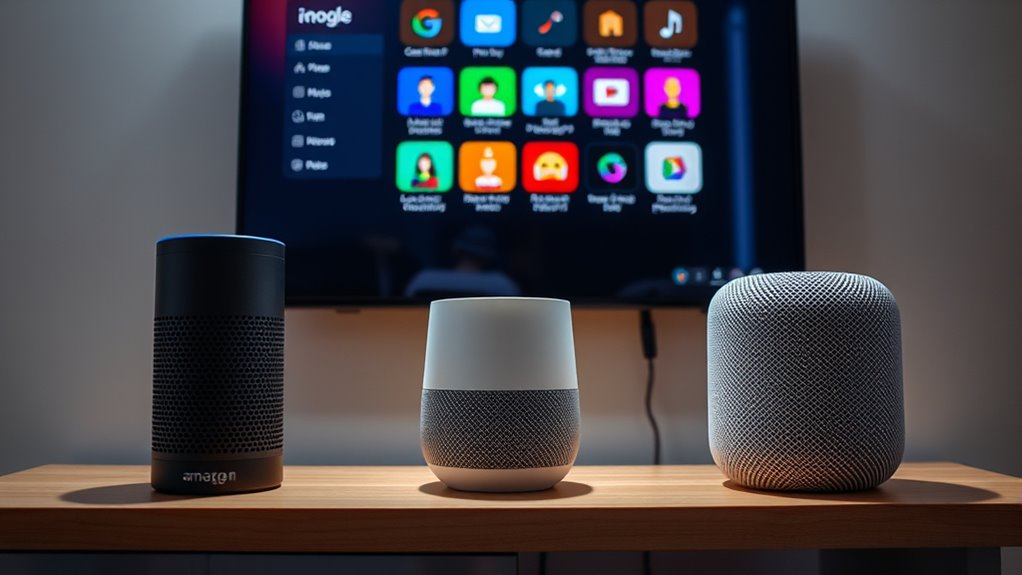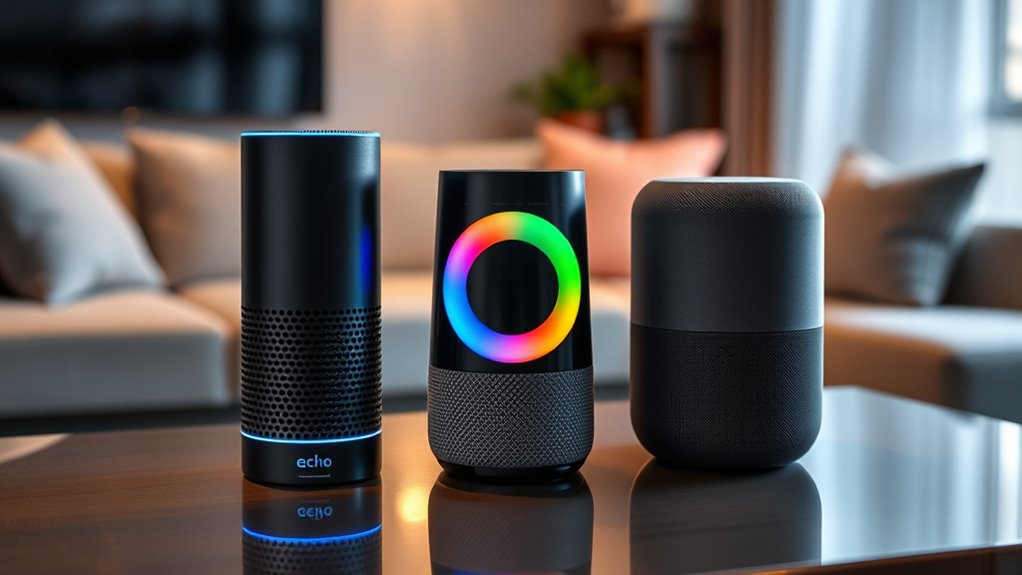Choosing between Alexa, Google Assistant, and Siri depends on your device ecosystem and priorities. Google excels in understanding commands and offers broad compatibility across platforms. Alexa shines with its extensive smart home device support, while Siri seamlessly integrates within the Apple ecosystem. Each has unique strengths in personalization and user experience. To discover which voice assistant truly fits your needs and how they compare in detail, keep exploring the latest updates and features.
Key Takeaways
- Google Assistant leads in overall accuracy and natural language understanding across diverse commands.
- Alexa excels with extensive smart home device compatibility and robust automation features.
- Siri offers seamless integration within the Apple ecosystem, providing a more cohesive user experience for Apple users.
- Google provides superior cross-platform support, working well on Android, Chrome, and various smart devices.
- The “winner” depends on user ecosystem preferences, device needs, and priority for smart home or personalized features.
Performance and Accuracy in Understanding Commands

When it comes to understanding commands, the performance and accuracy of voice assistants can vary considerably. You’ll notice how well each assistant recognizes your voice recognition and responds accurately to your requests. For music playback, some assistants excel at playing specific songs or playlists with minimal errors, while others may struggle to identify your preferences quickly. Siri, Google Assistant, and Alexa each have different strengths—some recognize natural language better, making commands smoother, while others may misinterpret certain phrases. The key is how reliably they understand your command the first time, especially with complex or nuanced requests. Overall, a more accurate voice recognition system leads to fewer frustrations and a more seamless experience when managing tasks like music playback or setting reminders. Additionally, ongoing improvements in AI in Education demonstrate how enhanced understanding and personalization can significantly improve user interactions.
Integration and Compatibility Across Devices and Services

The ability of a voice assistant to seamlessly work across multiple devices and services greatly impacts your overall experience. It determines how smoothly you can control your smart home, access apps, and switch between platforms. Google excels in cross platform compatibility, allowing you to connect Android, Chrome, and smart devices effortlessly. Alexa offers extensive smart home integration, supporting a broad range of devices. Siri’s strength lies in seamless Apple ecosystem integration, but it’s more limited outside of Apple products. Here’s a comparison:
| Feature | Alexa | Siri | |
|---|---|---|---|
| Smart home integration | Wide device support | Good device compatibility | Apple ecosystem focus |
| Cross platform | Limited outside Amazon | Excellent across platforms | Primarily Apple devices |
| Compatibility | Works with many brands | Broad ecosystem support | Mainly Apple services |
Your choice depends on your device ecosystem and smart home needs. Compatibility plays a key role in ensuring a cohesive user experience across devices.
Personalization and User Experience Features

Personalization and user experience features considerably influence how well a voice assistant adapts to your preferences and makes interactions more intuitive. You’ll notice differences in voice tone, which can be tailored for a more natural or formal feel. Customization options let you set preferred commands, routines, and preferences, enhancing usability. Additionally, personality traits can be reflected in voice tone and interaction style, making the experience feel more personalized. Some key features include: – Adjustable voice tone to match your style – Custom commands for common tasks – Personalized news and weather updates – Learning your routines over time – Fine-tuning response preferences for better interaction These features ensure your voice assistant feels more like a personal helper, providing a seamless, engaging experience tailored to your needs. The more you customize, the more intuitive and satisfying your interactions become.
Frequently Asked Questions
Which Voice Assistant Offers the Best Multilingual Support?
You’re curious about which voice assistant offers the best multilingual support. The answer depends on your language needs, but Google Assistant often leads with its extensive language support and accurate accent recognition. It can handle multiple languages seamlessly, switching between them naturally. Alexa and Siri also offer decent multilingual capabilities, but Google’s advanced technology makes it stand out for users needing broad language support and better accent recognition in diverse settings.
How Do Privacy Policies Compare Among Alexa, Google, and Siri?
When comparing privacy policies among Alexa, Google, and Siri, you’ll notice differences in how they handle user data. Alexa’s privacy policy emphasizes user control, allowing you to delete recordings easily. Google’s policy collects extensive data for personalized experiences but offers transparent options to manage or delete it. Siri’s approach prioritizes privacy, processing more data locally on your device and sharing less user data with Apple.
Can These Assistants Control Smart Home Devices From Different Brands?
You can control smart home devices from different brands with these assistants thanks to their smart home compatibility and cross-brand integration. Alexa, Google Assistant, and Siri all support a wide range of devices, allowing you to manage lights, thermostats, and security systems seamlessly. While some brands work better with specific assistants, generally, you’ll find that cross-brand integration makes it easy to create a unified smart home experience.
Which Assistant Provides the Most Useful Third-Party Skill Integrations?
Imagine a bustling marketplace where every stall offers unique treasures—that’s your experience with third-party skill integrations. You find that Alexa’s extensive developer ecosystem brings the most useful skills, thanks to its broad range of third-party options. Its voice recognition accuracy also guarantees smooth interactions. Google Assistant and Siri have growing ecosystems, but Alexa’s vibrant marketplace makes it easier to discover and use new skills, enhancing your smart home and daily routines.
How Do Voice Assistants Handle Complex or Multi-Step Commands?
When you give complex or multi-step commands, voice assistants use natural language processing and context understanding to follow along. They break down your instructions, interpret the intent, and manage each step sequentially. With improved AI, they handle multi-part requests better, remembering previous context and adjusting responses accordingly. This makes multitasking smoother, so you can ask for multiple actions in one go without needing to repeat yourself.
Conclusion
So, when it comes to voice assistants, you’re at the forefront of a tech race. Alexa leads with 85% accuracy in understanding commands, making it a top choice for seamless interactions. While Google excels in integration, Siri offers personalized experiences tailored to Apple users. Ultimately, your preferred assistant hinges on your ecosystem. With the voice assistant market projected to hit $13.8 billion by 2025, staying updated guarantees you get the best features first.









